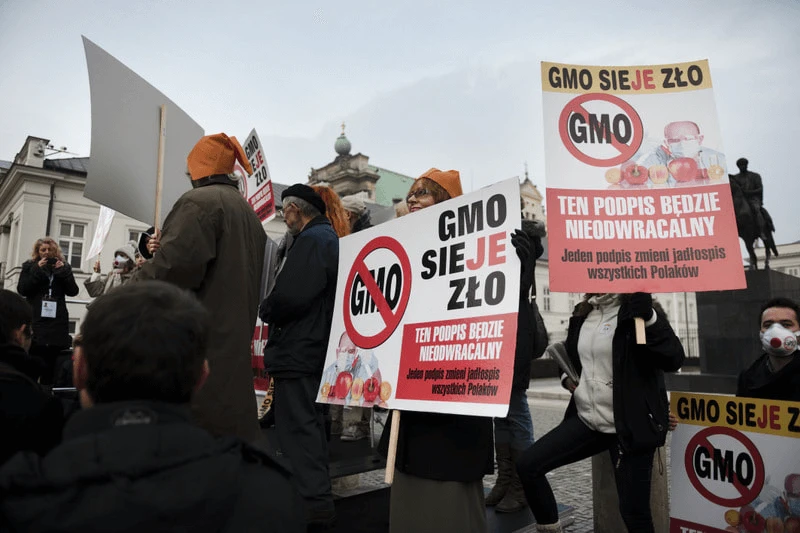Green activist setbacks
Green activist setbacks — Internal divisions and zero-compromise approach to biotechnology highlights recent campaign failures by European environmental activists


2023 marked a tumultuous year for European environmental activists, witnessing significant setbacks in their long-standing campaigns against pesticides and genetically modified organisms (GMOs). The European Commission’s decision to reauthorise the controversial herbicide glyphosate for another decade, alongside the European Parliament’s rejection of the Sustainable Use Regulation (SUR), dealt a heavy blow to the EU’s Farm2Fork ambitions. Furthermore, the EU’s shift towards deregulating new genomic techniques (NGTs) has sparked a debate on the future of seed breeding, challenging the activists‘ narrative and influence in Brussels.
The activists’ ambitious goals, such as an 80% reduction in pesticide use, have often clashed with practical realities, leading to their proposals being significantly diluted or outright rejected. This gap between aspiration and attainability has been a recurring theme, undermining their efforts to shape policy effectively. Additionally, the lack of a unified stance on NGTs has exposed fissures within the activist community, diluting their influence at a critical juncture as the EU contemplates easing restrictions on gene-edited plants.
The reliance on a limited pool of influential figures and a confrontational approach towards regulatory bodies have further hampered the activists’ campaigns.
…
As the EU moves forward, the environmental movement must reassess its strategies, embracing compromise and broadening its alliances to remain a significant force in shaping Europe’s ecological future.
This is an excerpt. Read the original post here

 | Videos | More... |

Video: Nuclear energy will destroy us? Global warming is an existential threat? Chemicals are massacring bees? Donate to the Green Industrial Complex!
 | Bees & Pollinators | More... |

GLP podcast: Science journalism is a mess. Here’s how to fix it

Mosquito massacre: Can we safely tackle malaria with a CRISPR gene drive?

Are we facing an ‘Insect Apocalypse’ caused by ‘intensive, industrial’ farming and agricultural chemicals? The media say yes; Science says ‘no’
 | Infographics | More... |

Infographic: Global regulatory and health research agencies on whether glyphosate causes cancer
 | GMO FAQs | More... |

Why is there controversy over GMO foods but not GMO drugs?

How are GMOs labeled around the world?

How does genetic engineering differ from conventional breeding?
 | GLP Profiles | More... |

Alex Jones: Right-wing conspiracy theorist stokes fear of GMOs, pesticides to sell ‘health supplements’




 Viewpoint — Fact checking MAHA mythmakers: How wellness influencers and RFK, Jr. undermine American science and health
Viewpoint — Fact checking MAHA mythmakers: How wellness influencers and RFK, Jr. undermine American science and health Viewpoint: Video — Big Solar is gobbling up productive agricultural land and hurting farmers yet providing little energy or sustainabilty gains
Viewpoint: Video — Big Solar is gobbling up productive agricultural land and hurting farmers yet providing little energy or sustainabilty gains Fighting deforestation with CO2: Biotechnology breakthrough creates sustainable palm oil alternative for cosmetics
Fighting deforestation with CO2: Biotechnology breakthrough creates sustainable palm oil alternative for cosmetics Trust issues: What happens when therapists use ChatGPT?
Trust issues: What happens when therapists use ChatGPT? 30-year-old tomato line shows genetic resistance to devastating virus
30-year-old tomato line shows genetic resistance to devastating virus California, Washington, Oregon forge immunization alliance to safeguard vaccine access against federal undermining
California, Washington, Oregon forge immunization alliance to safeguard vaccine access against federal undermining The free-range chicken dilemma: Better for birds, but with substantial costs
The free-range chicken dilemma: Better for birds, but with substantial costs ‘You have to treat the brain first’: Rethinking chronic pain with Sanjay Gupta
‘You have to treat the brain first’: Rethinking chronic pain with Sanjay Gupta
